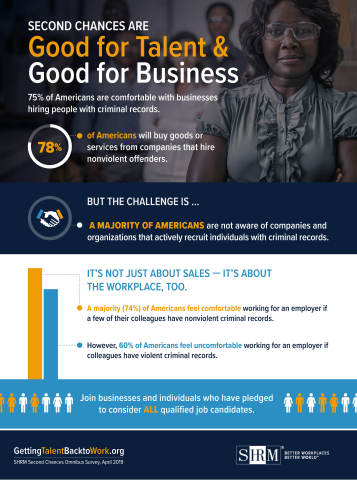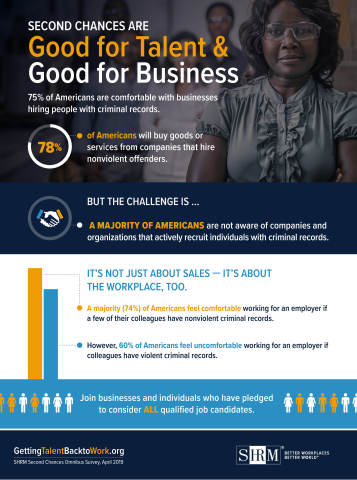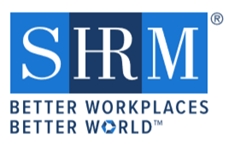ALEXANDRIA, Va.--(BUSINESS WIRE)--The vast majority of American consumers wholeheartedly support the idea of buying from businesses that employ workers with nonviolent criminal records, bolstering employers’ inclusive hiring practices, according to new research from SHRM — the Society for Human Resource Management and the Charles Koch Institute (CKI).
The survey — released as executives from SHRM and the SHRM Foundation attended a Department of Labor and White House criminal justice reform strategy session — revealed that almost four in five Americans (78 percent) will buy goods or services from businesses where a customer-facing employee has a nonviolent criminal record.
Among the survey’s other key findings:
- More than one-half of those surveyed (55 percent) feel comfortable buying goods or services from businesses if a customer-facing employee has spent five or more years in prison.
- Three in four Americans (75 percent) feel comfortable if the business they are buying goods or services from is known to give those who have a criminal record a second chance by giving them a job.
“This new data should give employers a renewed sense of confidence to hire qualified candidates with criminal records,” said Johnny C. Taylor, Jr., SHRM-SCP, SHRM’s president and chief executive officer. “With HR professionals, hiring managers and now customers all embracing the idea of giving these people a second chance, the country is primed for getting talent back to work.”
The new research coincides with the beginning of national Second Chance Month, which raises awareness about employment barriers and other challenges people with criminal records face as they work to improve their lives. It also comes after the launch of Getting Talent Back to Work, a SHRM and Koch-led initiative encouraging organizations to pledge to change their hiring practices for such individuals. To date, more than 1,000 individuals, companies, associations and nonprofits have taken the pledge.
The survey comes nearly a year after SHRM and CKI released research showing that a majority of workers in all roles said they were willing to hire and work with those who have a criminal record. The 2018 study also discovered concern among employees that customers would react negatively to learning that other employees had criminal records. Yet, according to today’s report, that concern seems to be unfounded.
“We now know there’s little truth to the perception that customers will vehemently balk at the idea of shopping at a place that employs people with criminal records,” said Vikrant Reddy, senior research fellow at CKI. “As the country experiences a labor shortage, more businesses would be wise to consider hiring people with records — especially given that both customers and employees are extremely receptive to the idea.”
Despite the strong support for helping people convicted of nonviolent offenses get a second chance, support falls when it comes to those convicted of violent offenses. Less than one-third of Americans (31 percent) said they feel comfortable buying goods or services from businesses where a customer-facing employee has a violent criminal record. Sixty-three percent said this would make them uncomfortable.
Among workers, the results are similar. Seventy-four percent of Americans feel comfortable working for an employer if a few of their colleagues have nonviolent criminal records, but only 33 percent of Americans feel the same way if the colleagues in question have violent criminal records.
These findings underscore the need for additional public dialogue around ensuring effective rehabilitation for individuals convicted of violent offenses who are returning to communities.
Interestingly, while 76 percent said they are comfortable working for an employer that is known to hire those who have a criminal record, 59 percent said they feel comfortable working for an employer that is known to have a strict hiring policy that excludes anyone with a criminal record.
For details, visit https://www.shrm.org/hr-today/trends-and-forecasting/research-and-surveys/Pages/Workers-with-Criminal-Records-Consumer-and-Employee-Perspectives.aspx.
Methodology: The research polled 1,003 Americans using AmeriSpeak Omnibus, a monthly multi-client survey using NORC at the University of Chicago’s probability-based panel designed to be representative of the U.S. household population. The survey was conducted from March 12 to March 18, 2019, using both online and phone methods.
MEDIA: For more information about the research project or to schedule an interview, please contact Kate Kennedy at 703-535-6260 and Kate.kennedy@shrm.org or Vanessa Hill at 703-535-6072 and Vanessa.hill@shrm.org. To speak to CKI Senior Research Fellow Vikrant Reddy, please contact Geoff Holtzman at 703-405-3511 and gholtzman@inpursuitof.com.
About the Society for Human Resource Management
SHRM, the Society for Human Resource Management, creates better workplaces where employers and employees thrive together. As the voice of all things work, workers and the workplace, SHRM is the foremost expert, convener and thought leader on issues impacting today’s evolving workplaces. With 300,000+ HR and business executive members in 165 counties, SHRM impacts the lives of more than 115 million workers and families globally. Learn more at SHRM.org and on Twitter @SHRM.
About the Charles Koch Institute
For more than five decades, Charles Koch’s philanthropy has inspired bold new ideas to improve American lives. Inspired by a recognition that free people are capable of extraordinary things, the Charles Koch Institute supports education and dialogue to advance these principles and challenge convention. We work to remove barriers to opportunity for all Americans, helping individuals transform their lives. To learn more visit charleskochinstitute.org.




